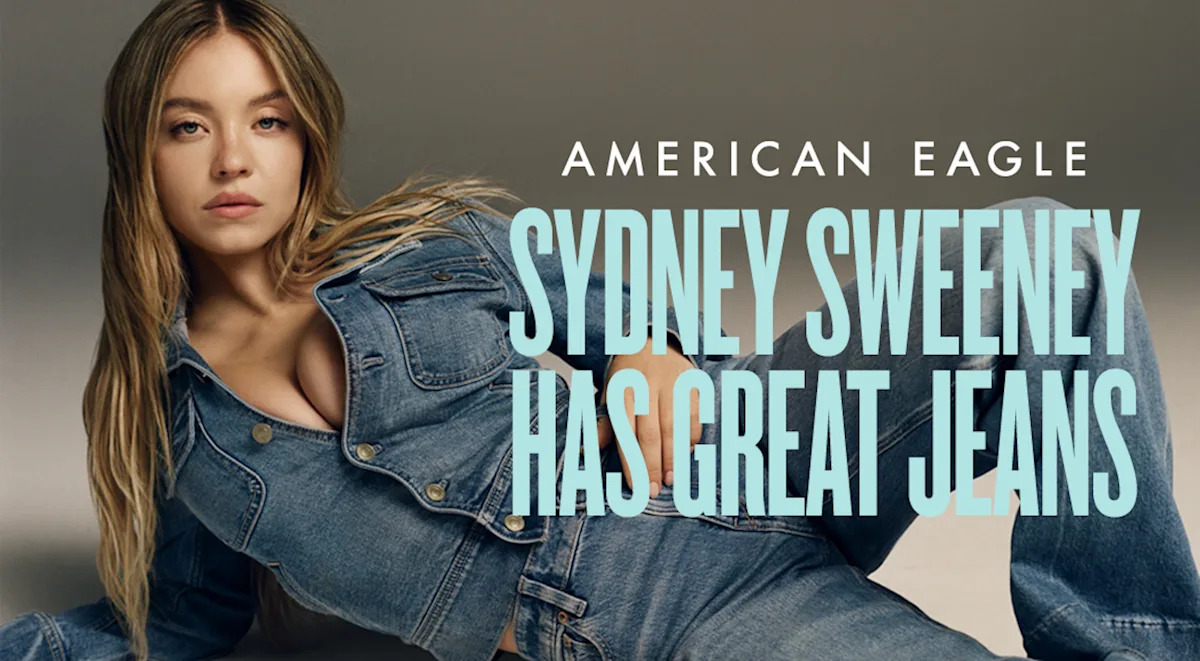The world of advertising often walks a tightrope, balancing creativity with public perception. Rarely, however, does a campaign spark such intense controversy only to emerge as a runaway commercial success. Such is the curious case of American Eagle`s recent collaboration with actress Sydney Sweeney, a campaign that became a lightning rod for accusations ranging from racism to fat-shaming, yet simultaneously shattered sales records.
The Slogan and Its Intent: A Play on Words That Went Sideways
At the heart of the storm was the seemingly innocuous slogan: “Sydney Sweeney has great jeans.” A clever, if somewhat transparent, play on words, intended to evoke both the quality of American Eagle`s denim and a subtle nod to genetic good fortune (“great genes”). The brand, presumably, aimed for a lighthearted, aspirational message, leveraging Sweeney`s considerable star power and physique. It was a classic celebrity endorsement, designed to generate buzz and connect with a youthful demographic. What could possibly go wrong with a straightforward compliment?
The Avalanche of Accusations: From Denim to Discrimination
The internet, however, interpreted the message through a far more critical lens. Social media platforms quickly ignited with outrage, proving once again that even the most carefully crafted marketing can be deconstructed and recontextualized in the unforgiving court of public opinion. Critics argued that the slogan, intentionally or not, promoted a discriminatory message. The phrase “great genes,” when applied to a conventionally attractive, slender, white actress, was deemed to imply genetic superiority, thereby excluding and shaming individuals who do not fit this narrow aesthetic ideal.
Accusations of fat-shaming, ableism (for implying an ideal physical form), and even racism (“white supremacy,” “Nazi propaganda”) began to circulate, transforming a simple denim ad into a complex socio-political debate. The outrage was swift, vocal, and, for many, deeply unsettling. The brand found itself caught in a maelstrom, with its lighthearted wordplay suddenly burdened with the weight of historical and societal grievances.
The Paradoxical Triumph: Selling Out Amidst the Storm
Yet, amidst the swirling storm of controversy, American Eagle quietly celebrated a remarkable commercial victory. The very collection of jeans endorsed by Sweeney, the subject of such fervent critique, sold out in less than a week. Individual pieces, we are told, vanished from shelves within a single day. The brand`s official statement painted a picture of unmitigated success, crediting Sweeney with attracting an “unprecedented number of new customers.” So pleased were they with the outcome, American Eagle announced plans for another collaboration with the actress before the year`s end. It seems public outrage, in this instance, functioned less as a deterrent and more as an unexpected amplifier.
Analyzing the Anomaly: Is All Publicity Good Publicity in the Digital Age?
This raises a fascinating, if somewhat uncomfortable, question for marketers: In an age of instant digital feedback and hypersensitive public discourse, is there such a thing as “bad publicity” anymore? Did the sheer volume of discussion, negative or otherwise, inadvertently propel the campaign into the public consciousness, driving curiosity and, ultimately, sales? One might ponder whether the vocal critics, in their very act of condemnation, inadvertently became unpaid viral marketers for the brand.
Or was it simply the undeniable appeal of Sydney Sweeney herself, an actress whose growing fame and dedicated fanbase might simply override any brand messaging missteps? Her star power, it appears, is potent enough to transcend (or perhaps even weaponize) online backlash. Perhaps it`s a potent cocktail of all three: a prominent celebrity, a provocative slogan that ensured virality, and a consumer base desensitized to online outrage, or even drawn to it by a sense of morbid curiosity.
The Uncomfortable Truth of Engagement in the Attention Economy
The American Eagle case serves as a stark reminder that in the attention economy, controversy, even when genuinely distressing to many, often translates directly into engagement. Brands now navigate a precarious landscape where every campaign faces immediate scrutiny, and misinterpretation can lead to public trials by social media. Yet, ironically, this very scrutiny can amplify reach beyond traditional advertising spend, turning potential PR disasters into unexpected commercial windfalls. It`s a delicate dance between maintaining brand integrity and inadvertently benefiting from the very outrage one might wish to avoid.
As the dust settles, the “great jeans” campaign leaves behind a complex legacy. It underscores the challenges brands face in crafting messages that resonate positively with a diverse audience, while simultaneously highlighting the sometimes paradoxical relationship between public outrage and commercial success. For American Eagle, a controversial wordplay turned into a goldmine. For the industry, it`s another intriguing, and perhaps unsettling, case study in the ever-evolving, often perplexing, rules of modern marketing.

